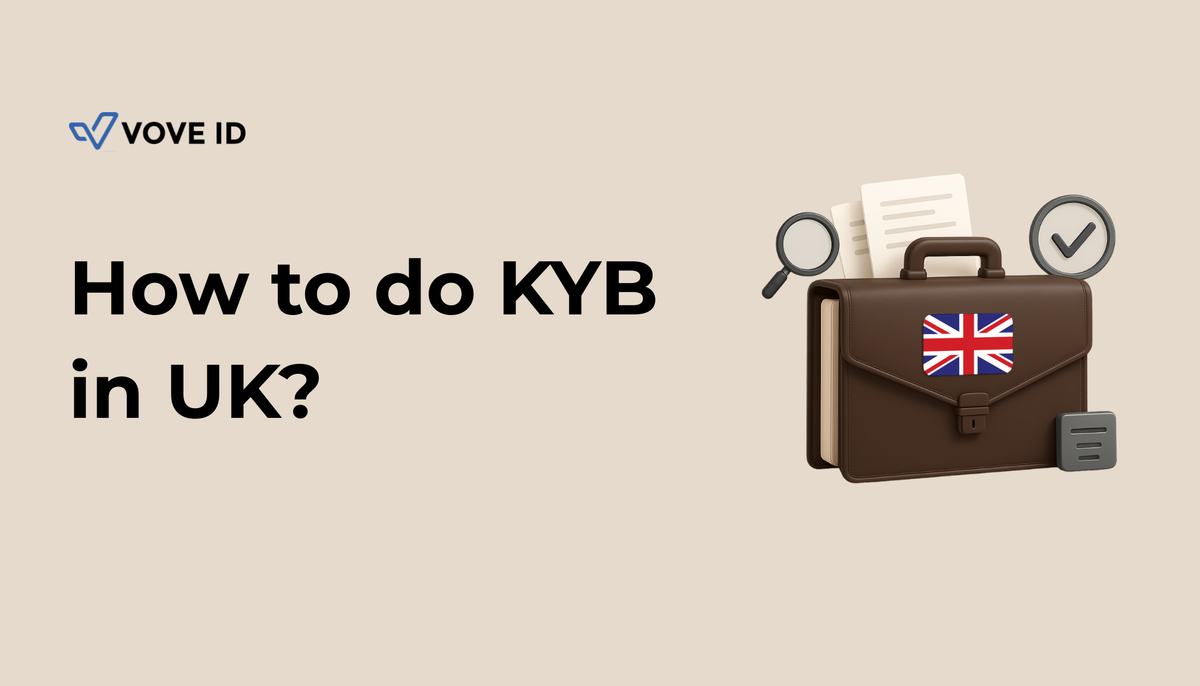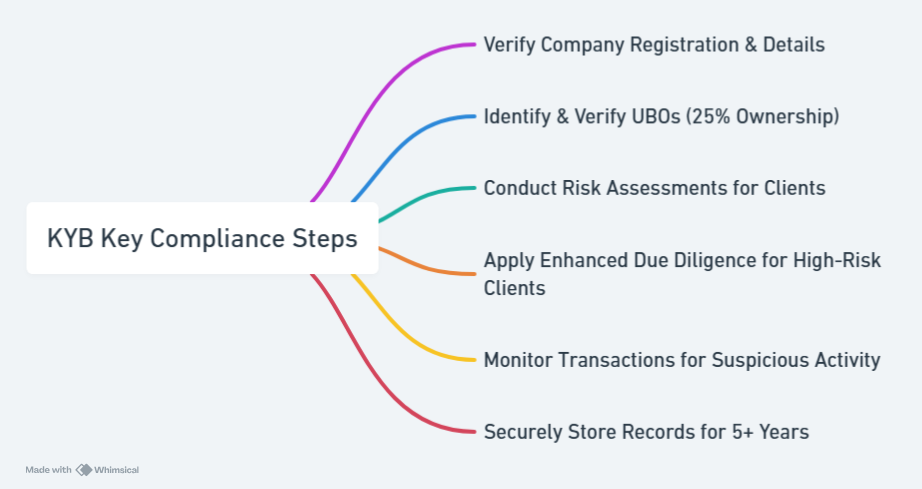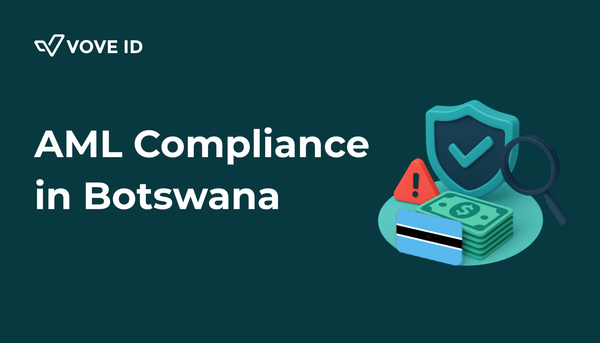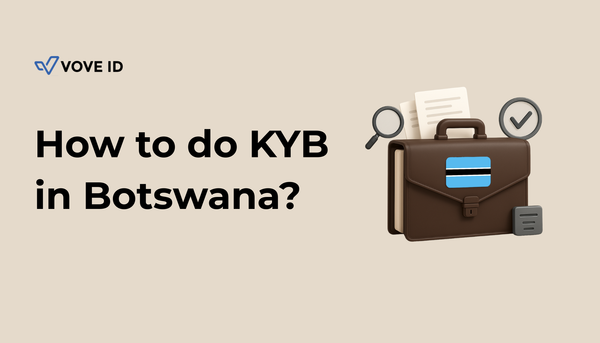KYB in the UK: A Practical Guide to Compliance
Navigate UK KYB requirements under MLR 2017 with UBO checks and risk-based compliance. Simplify financial crime compliance with VOVE ID’s KYB solutions.

Unlocking Trust in UK Business Relationships
In the UK’s fast-paced financial ecosystem, verifying the legitimacy of business partners is critical to staying secure and compliant. Know Your Business (KYB) regulations ensure companies confirm the identity and integrity of their corporate clients, safeguarding against fraud and financial crime. This guide dives into what KYB entails in the UK, who needs to comply, and how to streamline the process for seamless operations.
What Is KYB and Why Is It Required?
KYB is the process of verifying a business entity’s identity, structure, and risk profile to ensure it’s legitimate and not involved in illicit activities. In the UK, KYB is a key component of anti-money laundering (AML) frameworks, primarily governed by the Money Laundering, Terrorist Financing and Transfer of Funds Regulations 2017 (MLR 2017), enforced by the Financial Conduct Authority (FCA). These regulations aim to prevent money laundering, terrorist financing, and fraud by ensuring businesses know who they’re dealing with.
Non-compliance can lead to significant fines, legal action, or reputational damage, as outlined in the FCA’s financial crime guide. KYB builds trust, protects operations, and aligns with the UK’s risk-based approach to financial crime compliance.
Who Needs to Comply with KYB in the UK?
KYB requirements apply to businesses classified as “relevant persons” under MLR 2017, meaning entities involved in financial or high-value transactions. These include:
- Banks and financial institutions
- Payment and fintech companies
- Crypto service providers
- Law firms and accountancy practices
- Estate agents
- High-value goods dealers (e.g., luxury goods or art sellers)
If your business falls under these categories, you must conduct KYB checks on corporate clients before onboarding or processing significant transactions, as per gov.uk AML guidance.
Key KYB Requirements in the UK
To comply with UK KYB regulations, businesses must follow these essential steps:
- Business Identification: Collect details like the company’s legal name, registration number, registered address, and business type. This often involves checking records at Companies House.
- Verification: Confirm the business’s existence and details using trusted sources, such as Companies House, credit reference agencies, or digital KYB platforms.
- Ultimate Beneficial Owner (UBO) Checks: Identify and verify individuals owning or controlling more than 25% of the business, aligning with the 2023 Economic Crime and Corporate Transparency Act’s transparency requirements.
- Risk Assessment: Evaluate the business’s risk based on factors like industry, geographic location, or transaction patterns. High-risk entities, such as those linked to politically exposed persons (PEPs), require enhanced due diligence (EDD), a critical part of the UK’s risk-based approach to KYB and customer due diligence (CDD).
- Ongoing Monitoring: Continuously monitor business relationships for suspicious activity, such as irregular transactions.
- Record-Keeping: Maintain records of KYB checks and due diligence for at least five years, as mandated by MLR 2017.
The Joint Money Laundering Steering Group (JMLSG) provides practical guidance on applying KYB processes, helping businesses interpret MLR 2017 effectively. Digital KYB tools, including API-driven solutions, are also gaining traction, supporting the UK’s shift toward efficient, tech-driven compliance.
Challenges of KYB Compliance in the UK (and How to Overcome Them)
While KYB is vital, it presents several challenges:
- Regulatory Complexity: Navigating MLR 2017 and FCA updates can be daunting, especially with reforms like the 2023 Economic Crime and Corporate Transparency Act increasing scrutiny on UBOs.
- Data Accuracy: Verifying complex corporate structures or international businesses can be difficult, particularly when data is incomplete.
- Cost and Time: Manual KYB checks are resource-heavy, impacting smaller firms.
- Balancing User Experience: Lengthy verification processes may frustrate business clients, risking onboarding drop-offs.
Automated KYB solutions can address these by offering real-time data checks and seamless integration, ensuring accuracy and efficiency.
Streamlining KYB Compliance in the UK: Best Practices
Here’s how to optimize your KYB process:
- Leverage Digital Tools: Use automated KYB platforms to verify Companies House records, UBOs, and sanctions lists instantly.
- Follow JMLSG Guidance: Align with JMLSG recommendations to ensure robust, FCA-compliant processes.
- Train Staff: Equip teams to spot red flags, such as inconsistent UBO data or high-risk jurisdictions.
- Stay Updated: Monitor FCA updates and stay informed as Companies House reforms under the 2023 Economic Crime and Corporate Transparency Act continue into 2025, enhancing business transparency requirements.
Partnering with a trusted KYB provider like VOVE ID can simplify compliance, offering secure, scalable solutions tailored to UK regulations.
Case Study: Fintech Growth
London-based fintech PayEasy reduced onboarding delays by 35% with VOVE ID’s KYB platform. By automating Companies House checks and UBO verification, they enhanced compliance while improving client satisfaction.
KYB Compliance Checklist for UK Businesses in 2025

Wrapping Up
KYB in the UK is a cornerstone of financial integrity, protecting businesses from fraud and ensuring compliance with MLR 2017. By adopting digital tools and staying informed, companies can navigate KYB efficiently while building trust with partners. Protect your business and accelerate onboarding—discover how VOVE ID’s KYB solutions make UK compliance simple at our contact page!




